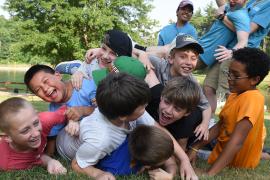As a camp counselor this summer, you are about to meet campers from all walks of life. Just a casual look at the changing demographics in the United States suggests that your chances of having an ethnically or racially diverse group of campers is, and will continue to be, greater than ever before. For example, the United States Census Bureau predicts that the number of Hispanics in the United States will almost double in the next twenty years, while Blacks will remain about the same. The number of Asians will increase by perhaps 30 percent while the number of Caucasians will slowly drop (United States Census Bureau). It will not be long before being White in the United States will mean being part of an ethnic or racial minority. Yet the differences among campers today go far beyond race or ethnic background, and if the goals of the American Camp Association's ambitious 20/20 Vision — to get over 20 million campers into camp by the year 2020 — even comes close to being met, then the influx of children from many different backgrounds will inevitably increase.
The concept here is diversity. What most people mean by diversity usually has to do with different races, religions, ethnic backgrounds, or sexual orientations. I have a much more fundamental way of thinking about diversity. Most simply, diversity refers to an awareness of whatever ways people are unlike us. To understand diversity in the most basic way is to appreciate that each individual's personal history and set of experiences gives him or her a unique identity and makes him or her different from us.
Even if most of your campers are of the same race, or come from similar neighborhoods, there will be tremendous, if sometimes subtle, variations among them. As I have already noted, those differences aren't just racial, religious, or socio-economic. Some of your campers will be from single-parent families; some from families with two mothers or two fathers; some will be from upscale homes while others will be more modest or even poor; some will be from urban settings while others will be from suburbs or rural areas; some will be thin, others obese; some will have diabetes or asthma, attention deficit disorder, or some other physical challenge; some will be Hispanic, Black, Asian, or White; some will be athletic and others artistic; some will be Christian, others Jews or Muslims or non-believers; some may even profess to having a sexual orientation different from your own. The possibilities seem endless. If you are like most counselors I speak with, you would probably say each one has a place at camp and is welcome in your group. And you probably truly mean that. So, what can you do to make sure your good intentions actually find their way into reality — that you move beyond simply having a slogan to having a group that truly is accepting of all of its members?
Welcome to My World
The first thing is to check your own biases and prejudices. We all tend to feel safest with people who are like us and whose values validate our own. This is basic identity — I am my experience; my experience is what I believe — and it is why it is so difficult for people to speak in civilized ways about politics, religion, or other major ways we are different from one another. The way we as humans regard our beliefs is who we are. Our natural tendency is to not only be suspicious of the beliefs, values, or views of others, but to experience them as negating us! But what we "naturally" tend to do is not necessarily what we are stuck with. We can see past our differences, but only if we remain open and interested. This is your first and perhaps most difficult primary job as a counselor. It is about expanding your own personal awareness. After all, if you can't accept the kid who is messy or the boy who is obese or the girl who is a clinger, then how will your campers ever accept them?
The challenge at camp is being able to step into another person's shoes — to step outside of your own experience and the values they have naturally given you — to begin to understand the reality of others. As the campers themselves would say, "Welcome to my world!" And as difficult as this can be for you as an adult to do, it is that much more difficult for campers!
Compartmentalized Thinking
First, let's understand that children naturally put people into "boxes" or categories. Compartmentalized thinking, which is the tendency to categorize people, things, and experiences into "types," is common among children of all ages. What children do instinctively is to gravitate toward others of "their kind." In a room full of many "things," the most interesting "thing" for children is other children their own age. Once children are grouped together by age, their desire to be with others of "their own kind" shifts to things like gender, race, religion, or even more subtle things like common experience or temperament (Harris 1998). At camp, the athletic kids gravitate toward one another while the DS-2 players scheme together and the jacks players organize their games and so on. This often results in campers — and even counselors — having a lack of acceptance of those whose differences are perceived as making them "not our kind."
Tell Their Stories
The second step is to proactively develop tolerance and acceptance among your campers. When you first meet your campers and have established a certain initial level of comfort with them, sit them down and get them to talk about themselves and their differences. Has anyone ever been the new kid in a class or in a school? Has anyone ever been in a new group of people where they felt like they were the only one? Has anyone ever been teased or bullied for being different? Once you let campers "tell their stories" in a guided and accepting way, they begin to develop more common ground with one another and a greater acceptance of one another. At that point, you ask your campers, "So how do we want to be here at camp?" That's where your slogan, "Everybody's In! Nobody's Out!" comes in. For a slogan to be meaningful, it must be tied to a meaningful experience. The little guided exercise I just described provides that common ground experience and helps campers tolerate one another's differences better.
Public Appreciation
After doing this exercise and perhaps even posting your new slogan in your cabin or tent or where your day camp group assembles, your job is to strengthen the practice on a daily basis. How do you do this? First, I suggest another ritual, which I call "public appreciation." Gather your campers together as a group once a day, at the same time every day, and have them raise their hand if they know of someone in the group — including a counselor or even someone from another group — who has helped them or shared with them in some way. To get it going the first time, you and your co-counselors will have to demonstrate how it works. "I want to thank Marlin for helping me during clean-up this morning! Marlin came over and volunteered to help hold the dust pan while I was sweeping, so thanks, Marlin!" Everyone applauds Marlin, and the next person goes. Do it for ten minutes every day at the same time of the day, and it will become a cherished routine. It also helps if you gather together with a few other cabins or groups the same age as your campers. Doing so will only promote a sense of gratitude and appreciation that is more wide spread.
Performance
The other way to promote a greater sense of acceptance among your campers — to get into that stage of group development called "performing," which are those moments when campers feel their greatest sense of cohesion — is to get them to play with one another. My colleague and friend, Faith Evans, says that children are closest when they play together. Her book, The More the Merrier, offers many great ideas about activities you can use to get your campers playing together. From my experience, there is nothing like kids playing together with abandon (that they are so engrossed in the play that it is as if nothing else exists in the world) to bring about greater acceptance. As Evans says, "People laughing and playing together creates . . . connections . . . an invitation to . . . the possibility of understanding, acceptance, inclusion, and even forgiveness (Faith Evans, Sam Sikes, and Chris Cavert 2007)." In other words, people who play together grow closer together!
One simple activity to play with your campers is something called, "Three Things in Common." Give your campers about two minutes, and let them see if they can "discover" three things they all have in common as a group that they can't tell simply from looking at one another, like we all have the same camp shirt! Something less obvious might be that we all have read a Harry Potter book. Challenge your campers to come up with ever more subtle things that they have in common — things that go beyond, "We all like pizza!" Doing so can help promote a greater sense of closeness among your campers.
It's Not Who We Are
One last important guiding principle is to recognize and to help your campers recognize that we do, indeed, make critical assessments of people; but we need to consider people based not on who they are, but on how they behave. For example, if you have a camper who reveals that he or she is gay, what is important is not this basic fact of their identity. Identity is more or less unchangeable. What is important is how they act. For example, are they kind or generous? Do they do the kinds of things good friends do with one another, like share, include others, and help out? Are they considerate of or patient with others? Some campers might take offense to the idea that another camper is gay, but what is truly important is how that gay camper conducts him or herself in the group.
Thinking about your campers this way helps them agree that how they are different is less important than how they treat one another. How often do children feel excluded, judged, teased, or misunderstood simply because of a label they've been given? Once you and your campers take a stand for behavior that is based on mutual respect, kindness, generosity, and gratitude, you will have created an environment where everyone feels safe to be who they are because they are assured they will be treated well. Isn't this exactly what a memorable camp experience is partly about? I can't think of a more powerful experience to give children in today's world.
References
United States Census Bureau, www.census.gov, accessed February 2009.
Harris, J. R. (1998). The Nurture Assumption — Why Children Turn Out the Way They Do, Touchstone, New York, New York.
Evans, F., Sikes, S., and Cavert, C. (2007). The More, The Merrier, self-published.
Bob Ditter is a licensed clinical social worker specializing in child, adolescent, and family therapy.
Originally published in the 2009 May/June issue of Camping Magazine.


